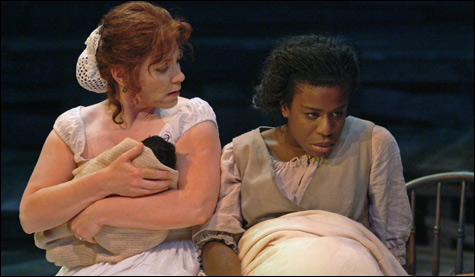
DESSA ROSE: Leigh Barrett and Uzo Aduba pack an emotional wallop. |
Perhaps only the team that triumphed with Ragtime would attempt a musical based on Sherley Anne Williams’s 1986 novel Dessa Rose. After all, Ragtime has three intersecting stories to work into its swirl of narrative and music, whereas this one has only two: one of an abandoned wife, the other of a female slave sentenced to the gallows. Stephen Flaherty & Lynn Ahrens’s 2005 musical, in its New England premiere from New Repertory Theatre (at the Arsenal Center for the Arts through May 18), tells both. And it enriches the material with some powerful hymn- and spiritual-based, even ragtime-inflected, songs. True, there is something preachy in the musical’s sledgehammer insistence that the horror of slavery not disappear from “living memory,” and something cheapening in its reduction of the yearning for freedom to a wish upon a star. But despite its flaws, Dessa Rose packs an emotional wallop, especially when the fierce Uzo Aduba is throwing the punch.
“We are descended,” the opening number begins, “from a strong line of women.” Two of them, the Caucasian Ruth and the African-American Dessa Rose, proceed to narrate the story of their intersection one summer in the 1840s. Ruth was a disappointed Charleston belle, waltzed off her feet by a gambler, then left to mind his half-completed rural estate and their infant daughter. Dessa Rose, a 16-year-old slave who lashed out when her lover was killed by their nasty master, proceeded to lead an uprising that got her sentenced to the gallows.
Moldering in a cellar cell until her baby (valuable property) could be born, Dessa Rose shared her story with a white journalist before a jailbreak brought her to the farm absently presided over by the passive Ruth that had become a refuge for runaway slaves. Initially resentful and mistrustful, the two young women eventually became part of a dangerous money-making scheme that involved the bogus sale, escape, and resale of their mostly black contingent. Stooped and barking, the elderly Ruth and Dessa Rose tell the story, which is enacted by the same actresses as their younger selves.
The double skein can be confusing, and with time out for some powerful music making, the tale necessarily becomes sketchy, the two main characters turning on a dime from trash-talking competitors to bonded co-conspirators. But there are some powerful performances and gorgeous voices deployed at New Rep, where Rick Lombardo’s production unfolds on a multi-level structure of slats backed by vivid skies. And there are a couple of knockout numbers, the better of them being the first-act finale, “Twelve Children,” in which Aduba’s Dessa Rose sings to her infant daughter about her own mother’s brood, the sold, the dead, the escaped, each etched by name in that “living memory” so oft evoked.
The wiry Aduba has an on-stage presence as deep and sinewy as her voice. Leigh Barrett — though old for the part of Ruth — captures the vulnerability and strength of the character coming into her own. And she nails the songs, particularly the bitter, dissonant “At the Glen.” Edward M. Barker brings a light, firm touch and vocal chops to Nathan, the brain behind “The Scheme,” and Todd Alan Johnson skillfully works his way through the agitated talk song of “Ink” before melting down as tortured journalist Adam Nehemiah, whose obsession with Dessa Rose is almost her undoing.